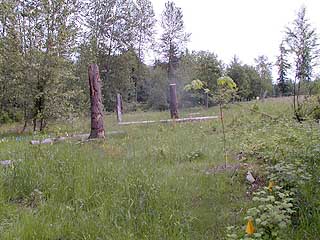
Cooke Scientific Services
Specialty: Wetland and stream-related services
Principal: Sarah Spear Cooke, Ph.D.
Year founded: 1995
2000 revenues: $350,000 to $450,000
Projected 2001 revenues: $300,000 to $400,000

Photo courtesy CSS |
Business is busy for Cooke Scientific Services, says principal Sara Spear Cooke. “For us, it’s been quite good,” she said. The five-person firm added two extra people for the summer to keep up with the work load.
“Summers are always busy monitoring projects that have been installed in the past,” Cooke said. One such project CSS is revisiting is a site on the Sammamish Plateau called the Arbors at Pine Lake for the Chaffey Corp. The site was restored a year ago, and now the firm will report back on the status of the site.
Along with delineating and inventorying wetlands and stream corridors, CSS assesses wetlands and monitors stream mitigations. The firm works for several jurisdictions, including cities, counties and tribes, often working with other larger firms on complex projects.
CSS specializes in wetland sand stream-related work, especially when it comes to helping clients with Endangered Species Act issues. “Almost every project that comes in these days requires a (biological evaluation),” she said.
One of the strengths of CSS, Cooke said, “is that we keep up on the ESA regulations probably more tightly than just about any other firm.” Staff time is spent calling agencies to find out what changes and new guidance have come out “on a weekly basis,” she said. “It’s pretty clear that other firms aren’t keeping up with it. (We’re) spending a lot of time helping other firms keep current.”
It’s that expertise in the ESA that keeps CSS busy. “I get through the grapevine that, for other companies, (business) hasn’t been so good,” Cooke said.
One factor may be a decrease in the amount of new development since the economy started to slow down. Another factor may be environmental regulations themselves. “With the fish issue, people are having up to a year, year-and-a-half delay on their projects,” she said.
“We pretty much always have work, if there’s work to be had,” Cooke said. “We have a fairly good reputation with the agencies.”
While CSS is keeping busy, Cooke said she isn’t planning to add a lot of new staff. “We may pick up a full-time person in the fall,” she said. “We do large projects by teaming with other firms. I really like the size that this office is now.”